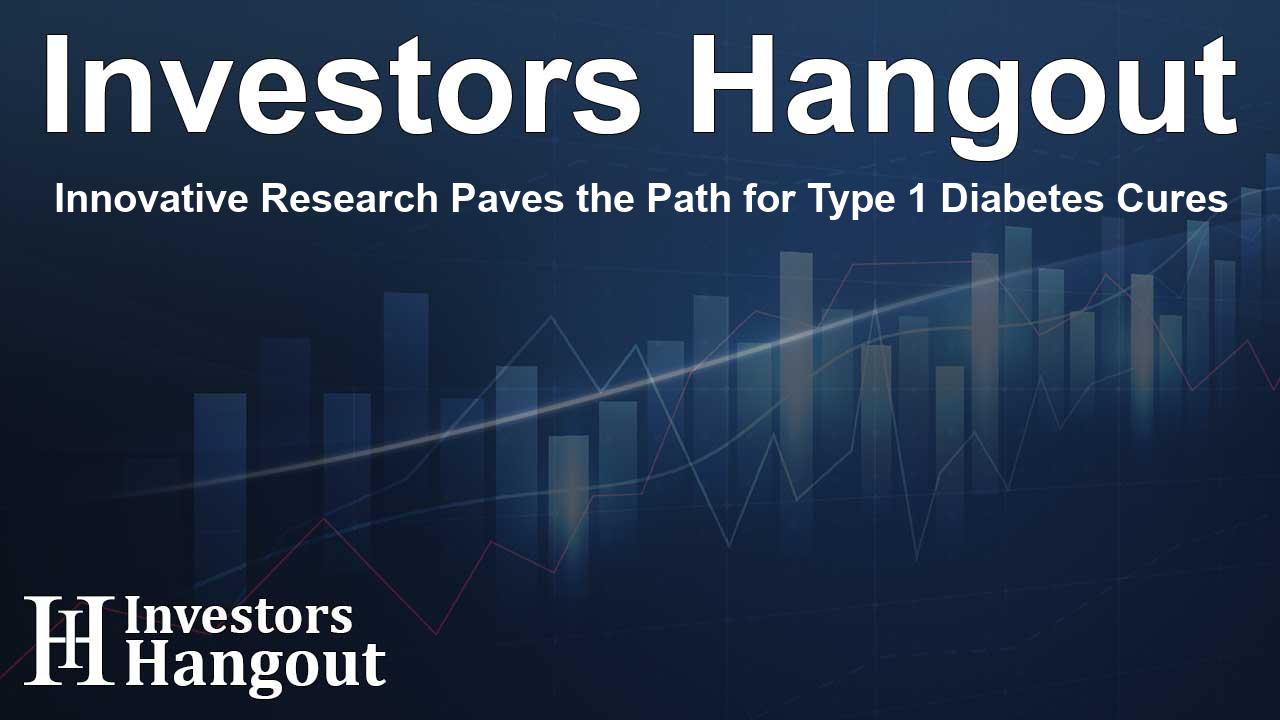Innovative Research Paves the Path for Type 1 Diabetes Cures

Insights into Revolutionary Diabetes Research
The journey toward effective treatments for type 1 diabetes (T1D) is witnessing a major leap forward thanks to a recent publication by Breakthrough T1D, a prominent organization dedicated to diabetes research and advocacy. The new paper, published in the renowned journal Diabetes, offers an extensive roadmap aimed at expediting the development of beta cell replacement therapies.
The Essence of the Paper
Authored by esteemed leaders and researchers from Breakthrough T1D, including vital contributions from Dr. Sanjoy Dutta and Dr. Esther Latres, this paper outlines comprehensive strategies that can guide clinical trials in the T1D field. By changing the way trials are designed, the goal is to accelerate the arrival of new therapies that could provide insulin independence to those living with T1D.
It is well established that beta cell replacement therapies have potential benefits, having shown success in certain cases. However, current approaches remain limited primarily to individuals struggling with severe blood sugar fluctuations and those requiring immunosuppression to protect transplanted cells.
Transforming Clinical Trial Methodologies
A significant takeaway from the paper stresses the importance of expanding clinical trial eligibility. This shift could allow a more diverse representation of individuals living with T1D to participate in trials, thereby equipping researchers with a broader understanding of treatment efficacy. The authors advocate for nuanced outcomes in such trials, prioritizing patient-reported findings and metrics from continuous glucose monitors, which highlight how well blood sugar levels are maintained.
Advocating for Patient-Centric Approaches
As noted by Dr. Marjana Marinac, it is essential for clinical trials to include a wider array of participants who may greatly benefit from the new therapies. She emphasizes that evaluating treatment outcomes should extend beyond clinical metrics. Instead, it should encompass how patients feel and overall functioning in daily life.
Dr. Esther Latres echoed these sentiments, pointing out that there remain significant needs within the T1D community that have yet to be addressed. She champions the necessity for clinical outcomes to align closely with the actual lived experiences of those managing diabetes on a day-to-day basis.
Aligned with Breakthrough T1D Mission
The objectives of this survey align seamlessly with Breakthrough T1D's broader mission and its Project ACT initiative. This initiative is focused on actualizing the clinical applications of cell therapies that could revolutionize treatment for T1D.
Understanding Type 1 Diabetes
Type 1 diabetes is an autoimmune disorder that drastically reduces or halts insulin production by the pancreas, leading to significant health implications for those affected. Individuals with T1D face daily challenges that demand constant monitoring of blood glucose levels to prevent potentially life-threatening complications, while also managing the emotional and physical burdens associated with the condition. Globally, close to 9 million people face these challenges, with many adults receiving their diagnosis later in life, often unaware that age is not a barrier to developing this chronic illness.
About Breakthrough T1D
Breakthrough T1D, formerly known as JDRF, remains a leading force in driving research and advocacy for T1D. Through investments in innovative research, collaboration with government bodies to address challenges faced by the T1D community, and supporting education initiatives, the organization strives to make daily living easier while paving the way toward potential cures.
As they rally behind the cause, Breakthrough T1D ensures a brighter future for those diagnosed with T1D. The organization is committed to empowering individuals by providing education, resources, and advocacy as they navigate life with this challenging condition.
Frequently Asked Questions
What is the primary focus of the recently published paper by Breakthrough T1D?
The paper outlines strategies for designing clinical trials that enhance the availability of beta cell replacement therapies for type 1 diabetes.
Who are the key contributors to the research paper?
Notable contributors include Dr. Sanjoy Dutta, Dr. Esther Latres, and Dr. Marjana Marinac, among others from Breakthrough T1D.
Why is broadening trial eligibility important?
Expanding eligibility helps to ensure a wider representation of patients, allowing for more comprehensive data on the efficacy of new therapies.
What outcomes does the paper suggest for evaluating therapies?
It recommends including patient-reported outcomes and continuous glucose monitoring metrics to measure the impact of therapies on daily life.
What is Breakthrough T1D's mission?
Breakthrough T1D aims to improve the lives of individuals with type 1 diabetes while driving progress towards potential cures through research and advocacy.
About The Author
Contact Evelyn Baker privately here. Or send an email with ATTN: Evelyn Baker as the subject to contact@investorshangout.com.
About Investors Hangout
Investors Hangout is a leading online stock forum for financial discussion and learning, offering a wide range of free tools and resources. It draws in traders of all levels, who exchange market knowledge, investigate trading tactics, and keep an eye on industry developments in real time. Featuring financial articles, stock message boards, quotes, charts, company profiles, and live news updates. Through cooperative learning and a wealth of informational resources, it helps users from novices creating their first portfolios to experts honing their techniques. Join Investors Hangout today: https://investorshangout.com/
The content of this article is based on factual, publicly available information and does not represent legal, financial, or investment advice. Investors Hangout does not offer financial advice, and the author is not a licensed financial advisor. Consult a qualified advisor before making any financial or investment decisions based on this article. This article should not be considered advice to purchase, sell, or hold any securities or other investments. If any of the material provided here is inaccurate, please contact us for corrections.
